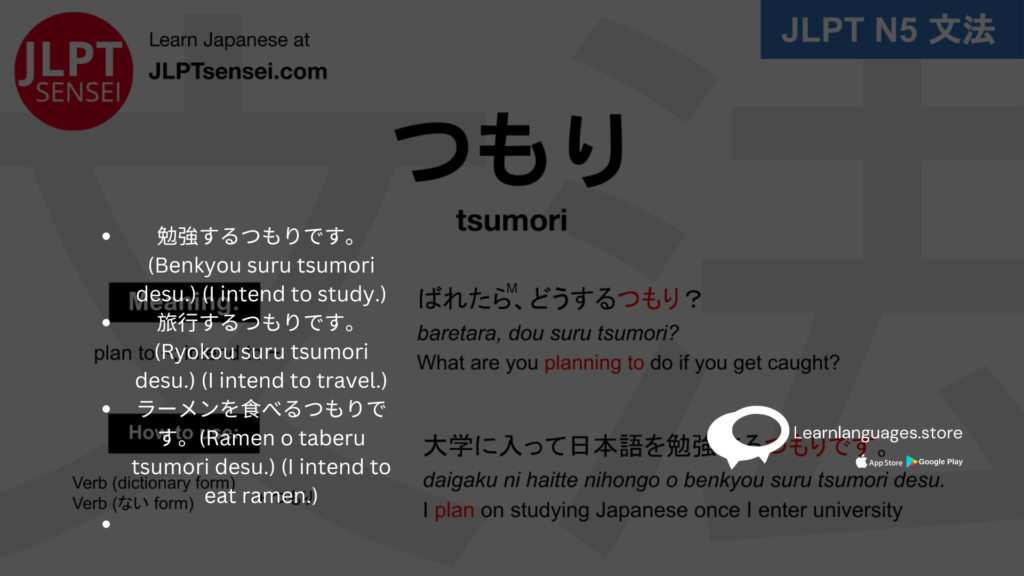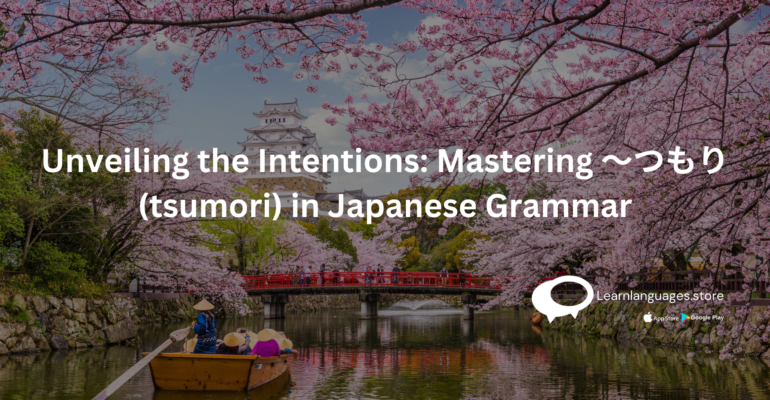Unveiling the Intentions: Mastering 〜つもり (tsumori) in Japanese Grammar
Unveiling the Intentions: Mastering 〜つもり (tsumori) in Japanese Grammar
Estimated reading time: 4 minutes

INTRODUCTION:
Konnichiwa, fellow language enthusiasts! Today, we’re diving into the fascinating realm of Japanese grammar with a focus on 〜つもり (tsumori), the key to expressing intentions and future plans. Whether you’re plotting a surprise birthday party or vowing to conquer Mount Fuji, 〜つもり (tsumori) is your trusty sidekick for conveying your intentions with clarity and conviction. So, grab your Japanese textbooks and let’s embark on this linguistic adventure together!
What is 〜つもり (tsumori)?
In Japanese grammar, 〜つもり (tsumori) is a phrase used to express one’s intention or plan to do something in the future. It’s like setting your sights on a goal and declaring, “I intend to do this!” Whether it’s studying Japanese diligently or promising to treat yourself to some delicious ramen, 〜つもり (tsumori) adds a layer of determination and commitment to your statements.
Sentence Structure:
The basic structure for forming sentences with 〜つもり (tsumori) is as follows:
[Plain form of verb] + つもり (tsumori)
Now, let’s break it down with some examples:
- 勉強するつもりです。(Benkyou suru tsumori desu.) (I intend to study.)
- 旅行するつもりです。(Ryokou suru tsumori desu.) (I intend to travel.)
- ラーメンを食べるつもりです。(Ramen o taberu tsumori desu.) (I intend to eat ramen.)
Examples with Humor:
- カラオケで歌うつもりです!(Karaoke de utau tsumori desu!) (I intend to sing at karaoke!) Imagine belting out your favorite J-pop tunes at karaoke night with friends, confidently declaring your intentions with a microphone in hand. Bonus points for nailing the high notes!
- 買い物するつもりですが、予算を超えないようにします。(Kaimono suru tsumori desu ga, yosan o koenai you ni shimasu.) (I intend to go shopping, but I’ll make sure not to exceed my budget.) Ah, the eternal struggle between retail therapy and financial responsibility. Who said adulthood was easy?
- 日本語を勉強するつもりです。でも、アニメを見る方が楽しいかもしれません。(Nihongo o benkyou suru tsumori desu. Demo, anime o miru hou ga tanoshii kamoshiremasen.) (I intend to study Japanese. But watching anime might be more fun.) The classic dilemma of language learners everywhere: hitting the textbooks vs. binge-watching anime. Decisions, decisions!
Exceptions and Usage:
While 〜つもり (tsumori) is a versatile tool for expressing intentions, there are a few exceptions and nuances to keep in mind:
- Negation: To express that you do not intend to do something, simply conjugate the verb in its negative form before adding 〜つもり (tsumori). For example: 買わないつもりです。(Kawanai tsumori desu.) – (I do not intend to buy.)
- Politeness: 〜つもり (tsumori) is typically used in casual or plain form speech. In formal situations or when speaking to someone of higher status, it’s common to use more polite expressions such as 〜つもりです (tsumori desu) or 〜つもりですか (tsumori desu ka).
Conclusion:
Congratulations, dear readers! You’ve now unlocked the power of 〜つもり (tsumori) and can confidently express your intentions and future plans in Japanese with flair and humor. Whether you’re aiming to climb the corporate ladder or simply looking forward to a relaxing weekend, 〜つもり (tsumori) is your ally in navigating the winding paths of life.
Arigatou gozaimasu for joining me on this linguistic journey. Until next time, mata ne! 🎌
-
Product on sale
 Japanese N4
Japanese N4₹18,300.00
₹24,300.00 -
Product on sale
 Japanese N5
Japanese N5₹16,300.00
₹18,300.00
Learn Languages Store
Vashi,
Email: services@learnlanguages.store










